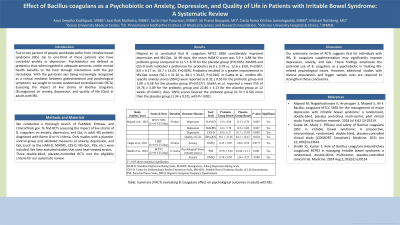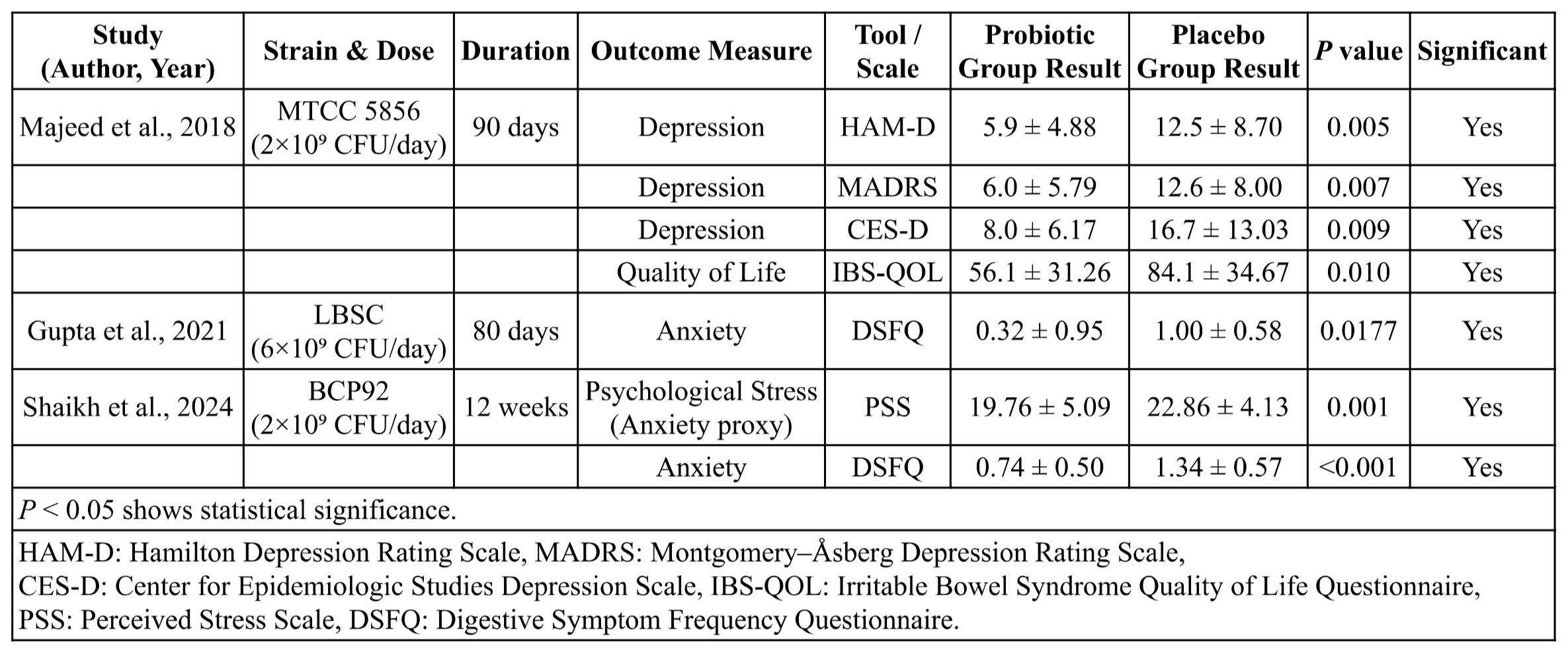Sunday Poster Session
Category: Functional Bowel Disease
P0791 - Effect of Bacillus coagulans as a Psychobiotic on Anxiety, Depression, and Quality of Life in Patients With Irritable Bowel Syndrome: A Systematic Review
Sunday, October 26, 2025
3:30 PM - 7:00 PM PDT
Location: Exhibit Hall

Has Audio
- AK
Aasa Deepika Kuditipudi, MBBS
Ocean University Medical Center
Lakewood, NJ
Presenting Author(s)
Aasa Deepika Kuditipudi, MBBS1, Saarthak Malhotra, MBBS1, Sai Sri Hari Paruchuri, MBBS2, Sri Pranvi Boyapati, MD3, Datta Rama Krishna Jonnalagadda, MBBS4, Michael Rothberg, MD5
1Ocean University Medical Center, Lakewood, NJ; 2Dr. Pinnamaneni Siddhartha Institute of Medical Sciences and Research Foundation, Hyderabad, Telangana, India; 3Ochsner University Hospital & Clinics, Lafayette, LA; 4JIPMER, Kraikal, Puducherry, India; 5Ocean University Medical Center, Brick, NJ
Introduction: Five to ten percent of people worldwide suffer from irritable bowel syndrome (IBS). Up to one-third of these patients also have comorbid anxiety or depression. Psychobiotics are defined as probiotics that, when ingested in adequate amounts, confer mental health benefits to the host through interactions with the gut microbiota. With the gut–brain axis being increasingly recognized as a critical mediator between gastrointestinal and psychological symptoms, we sought to review randomized controlled trials (RCTs) assessing the impact of live strains of Bacillus coagulans (B. coagulans) on anxiety, depression, and quality of life (QoL) in adults with IBS.
Methods: We conducted a thorough search of PubMed, Embase, and ClinicalTrials.gov. To find RCTs assessing the impact of live strains of B. coagulans on anxiety, depression, and QoL in adult IBS patients diagnosed with Rome III or IV criteria. Only studies with a placebo-control group and validated measures of anxiety, depression, and QoL (such as the HAM-D, MADRS, CES-D, IBS-QoL, PSS, etc.) were included. We have excluded studies that used heat-treated strains. Three double-blind, placebo-controlled RCTs met the eligibility criteria for our systematic review.
Results: Majeed et al. concluded that B. coagulans MTCC 5856 considerably improved depression and IBS-QoL. At 90 days, the mean HAM-D score was 5.9 ± 4.88 for the probiotic group compared to 12.5 ± 8.70 for the placebo group (P=0.005). MADRS and CES-D both indicated a preference for probiotics (6.0 ± 5.79 vs. 12.6 ± 8.00, P=0.007; 8.0 ± 6.17 vs. 16.7 ± 13.03, P=0.009). Probiotics resulted in a greater improvement in IBS-QoL scores (56.1 ± 31.26 vs. 84.1 ± 34.67; P=0.010). In Gupta et al., endline IBS-specific anxiety scores (DSFQ) were reported as 0.32 ± 0.95 for the probiotic group and 1.00 ± 0.58 for the placebo group (P=0.0177). Shaikh et al. reported a mean PSS of 19.76 ± 5.09 for the probiotic group and 22.86 ± 4.13 for the placebo group at 12 weeks (P=0.001). Also, DSFQ scores favored the probiotic group (0.74 ± 0.50) more than the placebo group (1.34 ± 0.57), with P< 0.001.
Discussion: Our systematic review of RCTs suggests that for individuals with IBS, B. coagulans supplementation may significantly improve depression, anxiety, and QoL. These findings emphasize the potential use of B. coagulans as a psychobiotic in treating IBS-related psychological issues. However, additional studies with diverse populations and bigger sample sizes are required to strengthen these conclusions.

Disclosures:
Aasa Deepika Kuditipudi, MBBS1, Saarthak Malhotra, MBBS1, Sai Sri Hari Paruchuri, MBBS2, Sri Pranvi Boyapati, MD3, Datta Rama Krishna Jonnalagadda, MBBS4, Michael Rothberg, MD5. P0791 - Effect of <i>Bacillus coagulans</i> as a Psychobiotic on Anxiety, Depression, and Quality of Life in Patients With Irritable Bowel Syndrome: A Systematic Review, ACG 2025 Annual Scientific Meeting Abstracts. Phoenix, AZ: American College of Gastroenterology.
1Ocean University Medical Center, Lakewood, NJ; 2Dr. Pinnamaneni Siddhartha Institute of Medical Sciences and Research Foundation, Hyderabad, Telangana, India; 3Ochsner University Hospital & Clinics, Lafayette, LA; 4JIPMER, Kraikal, Puducherry, India; 5Ocean University Medical Center, Brick, NJ
Introduction: Five to ten percent of people worldwide suffer from irritable bowel syndrome (IBS). Up to one-third of these patients also have comorbid anxiety or depression. Psychobiotics are defined as probiotics that, when ingested in adequate amounts, confer mental health benefits to the host through interactions with the gut microbiota. With the gut–brain axis being increasingly recognized as a critical mediator between gastrointestinal and psychological symptoms, we sought to review randomized controlled trials (RCTs) assessing the impact of live strains of Bacillus coagulans (B. coagulans) on anxiety, depression, and quality of life (QoL) in adults with IBS.
Methods: We conducted a thorough search of PubMed, Embase, and ClinicalTrials.gov. To find RCTs assessing the impact of live strains of B. coagulans on anxiety, depression, and QoL in adult IBS patients diagnosed with Rome III or IV criteria. Only studies with a placebo-control group and validated measures of anxiety, depression, and QoL (such as the HAM-D, MADRS, CES-D, IBS-QoL, PSS, etc.) were included. We have excluded studies that used heat-treated strains. Three double-blind, placebo-controlled RCTs met the eligibility criteria for our systematic review.
Results: Majeed et al. concluded that B. coagulans MTCC 5856 considerably improved depression and IBS-QoL. At 90 days, the mean HAM-D score was 5.9 ± 4.88 for the probiotic group compared to 12.5 ± 8.70 for the placebo group (P=0.005). MADRS and CES-D both indicated a preference for probiotics (6.0 ± 5.79 vs. 12.6 ± 8.00, P=0.007; 8.0 ± 6.17 vs. 16.7 ± 13.03, P=0.009). Probiotics resulted in a greater improvement in IBS-QoL scores (56.1 ± 31.26 vs. 84.1 ± 34.67; P=0.010). In Gupta et al., endline IBS-specific anxiety scores (DSFQ) were reported as 0.32 ± 0.95 for the probiotic group and 1.00 ± 0.58 for the placebo group (P=0.0177). Shaikh et al. reported a mean PSS of 19.76 ± 5.09 for the probiotic group and 22.86 ± 4.13 for the placebo group at 12 weeks (P=0.001). Also, DSFQ scores favored the probiotic group (0.74 ± 0.50) more than the placebo group (1.34 ± 0.57), with P< 0.001.
Discussion: Our systematic review of RCTs suggests that for individuals with IBS, B. coagulans supplementation may significantly improve depression, anxiety, and QoL. These findings emphasize the potential use of B. coagulans as a psychobiotic in treating IBS-related psychological issues. However, additional studies with diverse populations and bigger sample sizes are required to strengthen these conclusions.

Figure: Table: Summary of RCTs evaluating B. Coagulans effect on psychological outcomes in adults with IBS.
Disclosures:
Aasa Deepika Kuditipudi indicated no relevant financial relationships.
Saarthak Malhotra indicated no relevant financial relationships.
Sai Sri Hari Paruchuri indicated no relevant financial relationships.
Sri Pranvi Boyapati indicated no relevant financial relationships.
Datta Rama Krishna Jonnalagadda indicated no relevant financial relationships.
Michael Rothberg indicated no relevant financial relationships.
Aasa Deepika Kuditipudi, MBBS1, Saarthak Malhotra, MBBS1, Sai Sri Hari Paruchuri, MBBS2, Sri Pranvi Boyapati, MD3, Datta Rama Krishna Jonnalagadda, MBBS4, Michael Rothberg, MD5. P0791 - Effect of <i>Bacillus coagulans</i> as a Psychobiotic on Anxiety, Depression, and Quality of Life in Patients With Irritable Bowel Syndrome: A Systematic Review, ACG 2025 Annual Scientific Meeting Abstracts. Phoenix, AZ: American College of Gastroenterology.
